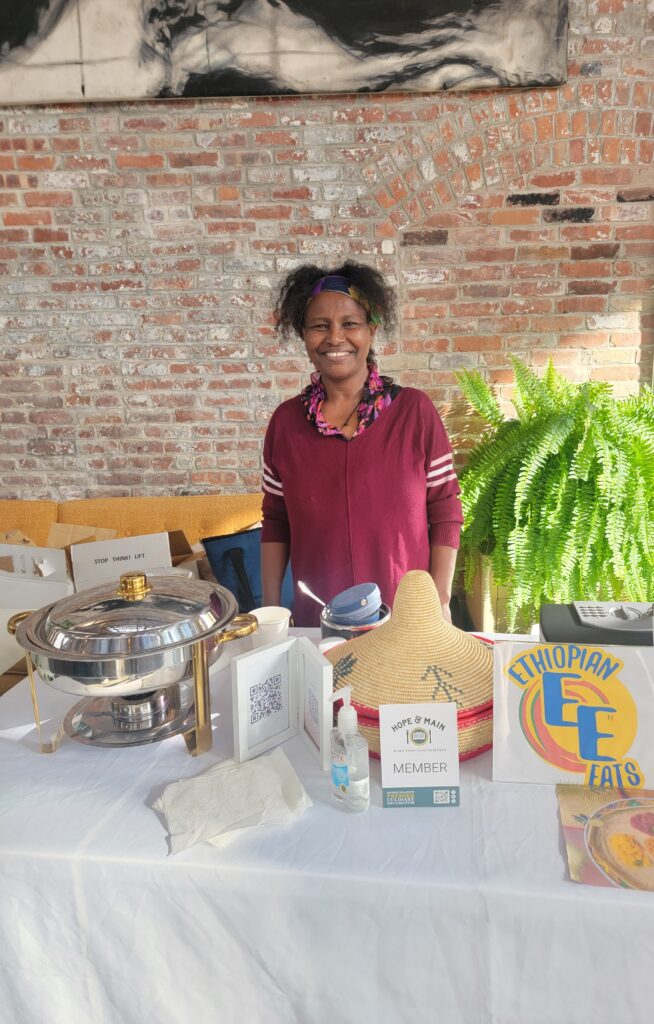
In 2010, Martha Tsegaye and her family immigrated from Ethiopia to Virginia; it was her first experience with snow.
“I had only seen snow in the movies or on television and then I got to touch it.”
Ethiopia is mountainous with high plateaus and dry lowlands, with a climate that ranges from arid in its northeastern and southeastern deserts, to wet and humid in equatorial rainforests running along the south and southwest; yet Tsegaye says of Rhode Island, “It seems like my country, I love it. I love the fall. In Virginia, it was so hot or so cold, here there are the seasons.”
She grew up in Addis Ababa, the capital of Ethiopia, a place she describes as diplomatic, full of diversity and culture, “It is so big, everything is there”; as a place with heavy rains in winter but not the cold.
“When I was a child it was suitable weather, but globally, everything has changed. Even my family has told me, ‘It’s so cold and so wet now.’ After the rain you can feel the coldness, but before, when I was a child, we went out and played in the rain… we enjoyed the rains.”
When she lived in Ethiopia, she and her older sister ran a restaurant. Tsegaye did a little of everything, from front of house to back of house, but she was always the one people wanted to cook.
“I mostly handled the kitchen, I was the one cooking. They begged me to cook, holiday food, everything… They loved when I cooked.”
In 2015, her husband’s work brought her and her family to Rhode Island. During the move, one of their movers warned her of “big Rhode Island snows,” but living in Virginia had prepared her.
Once in Rhode Island, her sons encouraged her to turn her passion for cooking into an opportunity. The only Ethiopian restaurant in Rhode Island had just closed, and her sons wanted her to do what she loved – to cook. And to sell what she made best: vegetarian Ethiopian cuisine — soft, spongy injera, stuffed jalapenos, seasoned beetroot, spicy misir wot, aromatic atakilt; unique stews and salads of creamy brown lentils, onions, cabbages, carrots and potatoes to scoop up with strips of tangy injera and share communally with family and friends and savor with the piquant warmth of comfort food.
“We have a culture of feeding others, it’s called gursha, so you can express your love by feeding… We share, we talk, we laugh, it is so amazing, you can connect with each other. That’s the way we eat.”
Like many Ethiopian Orthodox Church members, Tsegaye fasts nearly 200 days a year — every Wednesday and Friday, and at various dates throughout the year in observance of religious occasions. As fasting requires abstaining from meat, dairy, and eggs, many Ethiopian dishes are packed with nutritious plant proteins.
“Ethiopian food is fairly unique, aromatic, and spicy… It starts with our flatbread, injera, which is made from teff flour. Teff is an ancient grain we’ve been eating for thousands of years… Berbere is a blend of different spices and creates an exotic flavor. Beetroot is cooked with onions, tomatoes and turmeric. It has a spicy flavor but the seasoning of different types of garlic and ginger give it a full taste. Brown lentil salad combines cooked lentils with raw vegetables… There’s a lot of jalapenos, garlic, ginger, and olive oil. We put it on top of the injera, roll it up, and eat it with our fingers. Our bread is our utensil and it is also our meal, so the taste when combined is very different.”
With the encouragement of her family, Tsegaye enrolled in business classes at CCRI. There she found a supportive community of professors. “They made me feel comfortable, they encouraged me, it was so amazing.”
When she graduated from CCRI, COVID hit. It was too risky to open a restaurant, so she took to the internet to find another way to start her business. Through a process she calls “digging,” her term for searching the world around her until she hits upon what she wants (“I’m not a quitter, I dig.”), she discovered the culinary incubator Hope & Main.
“I didn’t waste any time, I jumped into my car and drove. I didn’t even call. I went there and spoke to them and they gave me an appointment… I started there and the response was amazing, everybody was so excited.”
At Hope & Main she found the support and resources she needed to turn her passion into a business, and just over a year ago she did it — Tsegaye founded Ethiopian Eats, the only place in RI serving Ethiopian food.
If Virginia is for lovers, then Rhode Island is for hope.
Tsegaye currently sells her cuisine every Saturday from 9am–1pm at the Farm Fresh Providence Farmers Market. Late last year, she was one of six finalists in the Sam Adams’ Brewing the American Dream Pitch Contest, a contest that helps local food and beverage entrepreneurs gain access to capital, networks, and business coaching. She hopes to expand her presence at farmers markets and, when the moment’s right, open her restaurant.
To connect with Martha follow @ethiopian_eats or visit ethiopian-eats.com.

